Now Reading: How JB Pritzker’s faith and Holocaust work are powering his dire warnings about Trump
-
01
How JB Pritzker’s faith and Holocaust work are powering his dire warnings about Trump
How JB Pritzker’s faith and Holocaust work are powering his dire warnings about Trump

As he walks through the Illinois Holocaust Museum & Education Center he helped create, Gov. JB Pritzker pauses in the very first exhibit.
The narrow hall of photos and headlines about the Nazis’ rise to power isn’t as emotionally heavy as other parts of the museum, like the German railcar of the kind used to deport people to the concentration camps, or the room of remembrance, which lists the names of some of the 6 million Jews murdered by the Nazis.
But he has a point to make.
Why We Wrote This
Illinois Gov. JB Pritzker has long invested in helping Americans understand the ongoing relevance of Nazi-era lessons. He says it’s never been more important.
It was at this moment in the early 1930s, when the Nazis crushed democracy and dissent while painting Jewish citizens as immigrant enemies of the state.
“People are having to make decisions about whether they’re going to stand up and speak out, or whether they’re going to try to keep their heads down and not be noticed,” Governor Pritzker says. “These are the choices that, in a slightly less dramatic fashion but no less important, that I think people are having to make today.”
Governor Pritzker has emerged as one of the loudest Democratic voices sounding the alarm about what he sees as the authoritarian tendencies of the Trump administration. And increasingly, he’s put his own personal story at the center of his argument. He has drawn on his family’s history as Jewish refugees, and his decade working on Holocaust issues, to warn in stark terms about the administration’s aggressive moves to crack down on immigrants and suppress dissent.
“It took the Nazis one month, three weeks, two days, eight hours, and 40 minutes to dismantle a constitutional republic,” he warned in his State of the State speech in February. “When the five-alarm fire starts to burn, every good person better be ready to man a post with a bucket of water if you want to stop it from raging out of control.”
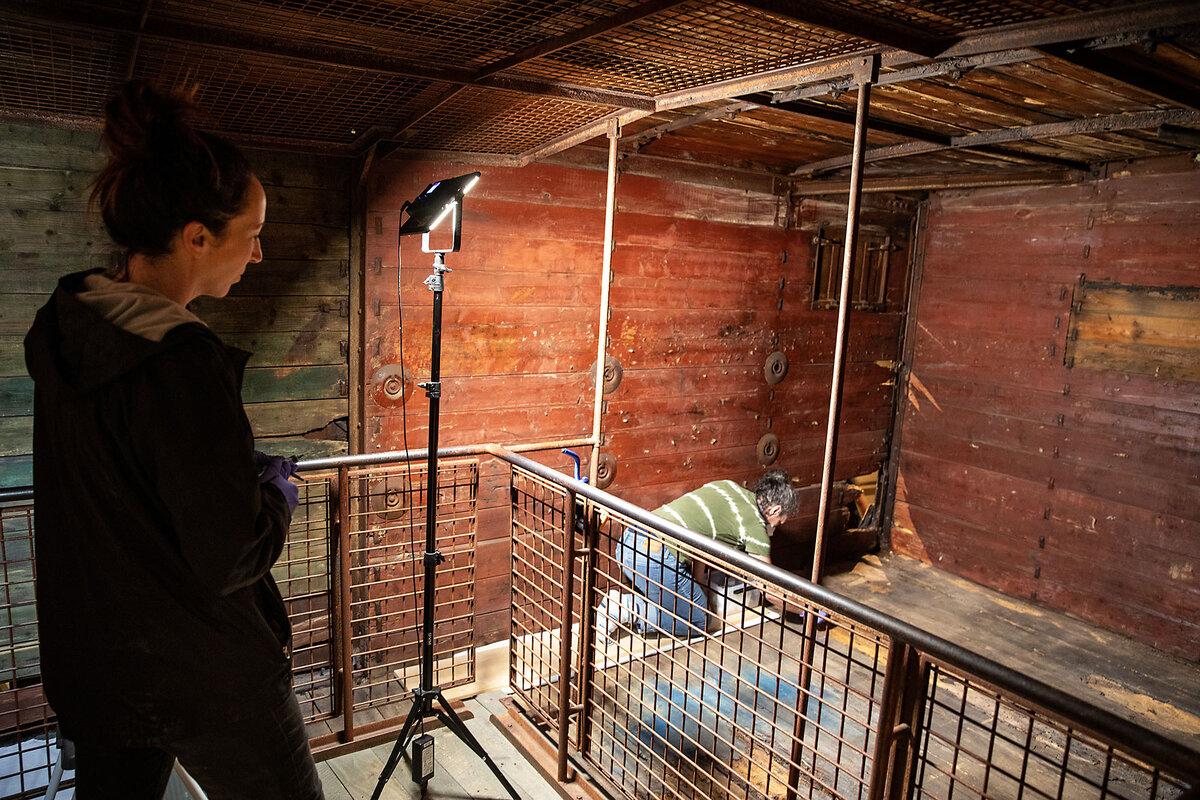
Melanie Stetson Freeman/Staff
The German railcar is the Illinois Holocaust Museum’s keystone artifact. Principal conservator Anna Weiss-Pfau (left) is working on preserving it. This original freight train car was the type used to transport Jews to their death.
In New Hampshire in late April, he excoriated some Democrats’ “simpering timidity,” and called for mass protests. “These Republicans cannot know a moment of peace,” he said. “We must castigate them on the soapbox and then punish them at the ballot box.”
Both speeches went viral on social media, helping to introduce the governor to a wider audience ahead of a potential 2028 presidential run.
And it’s put him squarely in the all-out-fighting side of the Democratic debate over how best to confront President Donald Trump.
It’s unclear how well this message will resonate. After all, former Vice President Kamala Harris closed her 2024 campaign with a similarly stark warning about President Trump’s authoritarian views – and lost. Many Capitol Hill Democrats believe attacking Republicans over pocketbook issues like proposed Medicaid cuts are a better political strategy than focusing on his crackdown on immigrants and dissent.
But in the wake of escalating raids from Immigration and Customs Enforcement, President Trump’s move to deploy National Guard troops and Marines to Los Angeles to quell protests, and his and ICE head Tom Homan’s threat to arrest California Gov. Gavin Newsom, more and more Democrats are issuing similar warnings.
On Thursday, House Oversight Committee Republicans summoned Mr. Pritzker and two other Democratic governors to testify about their states’ “sanctuary” policies. Mr. Pritzker talked about his own family’s refugee story – and vowed to fight ICE overreach. “I will stand in the way of Tom Homan going after people who don’t deserve to be frightened in their communities, who don’t deserve to be threatened, terrorized. I would rather that he came and arrested me than do that to the people of my state,” he said.
Governor Pritzker is also one of the most prominent Jewish politicians in the United States at a time of rising antisemitism driven by Israel’s war in Gaza, which the Trump administration has used to justify its crackdown on foreign students and universities. But his record of working on – and worrying about – these issues predates his political ambitions.
He first got involved with the Illinois Holocaust Museum in 1999, when Sam Harris asked for three minutes of his time.
Mr. Harris, an irrepressible former insurance executive who survived two concentration camps as a child, was working with other survivors to expand their small storefront museum and make sure their stories lived on after they were gone. He was told by a friend he needed to get “the richest guy in town” to help make it happen, so he reached out to Mr. Pritzker, a billionaire scion of the Hyatt hotel fortune.
Skokie, where the museum is located, at one point was home to more than 7,000 Holocaust survivors – believed to be the largest number anywhere outside Israel. In the late 1970s, neo-Nazis tried to hold a march in the town, spurring international attention, a Supreme Court case, and massive local pushback. Out of that fight sprang the original museum – a small storefront – and a successful campaign that made Illinois the first state in the nation to require Holocaust education in public schools.
By all accounts, Mr. Pritzker threw himself into building a new museum. For the next decade, he poured countless hours into securing funding and finding staff and experts, meeting with the group nearly every week. In the process, he developed close relationships with many survivors.
“He gave everything that he had,” Mr. Harris tells the Monitor, describing Governor Pritzker as family. “It definitely shaped his life.”
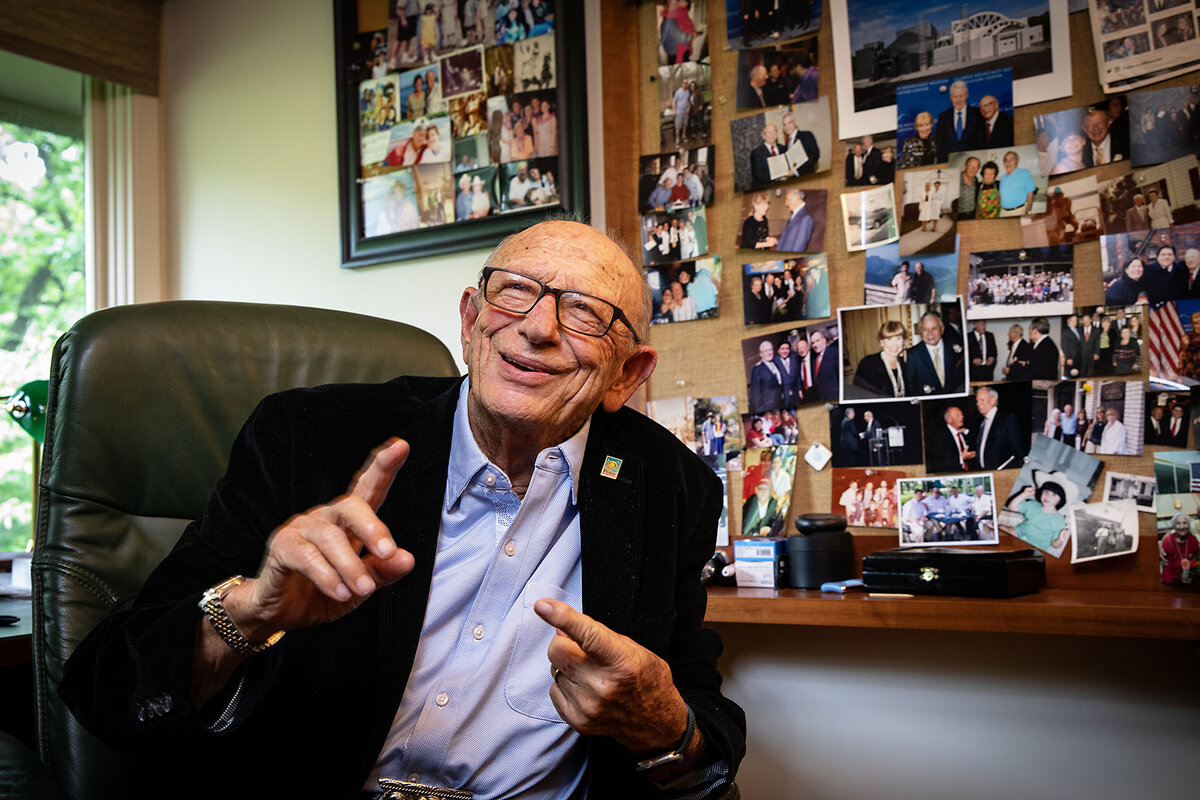
Melanie Stetson Freeman/Staff
Holocaust survivor Sam Harris in his office speaks about his work creating the Illinois Holocaust Museum in Skokie, Illinois, June 4, 2025.
The 65,000-square-foot museum opened in 2009 with keynote speeches from Holocaust survivor and Nobel laureate Elie Wiesel and former President Bill Clinton. More than 182,000 people visited the museum last year.
“Anything he says about the Holocaust, he is not just saying it for political purposes,” Mr. Harris says. “You’ve got to give him the credit. And anyone who doesn’t, doesn’t know. Let them talk to me.”
“Remember the past, transform the future.”
Governor Pritzker sees the current moment through the lens of his own family history.
“My family is only still alive because my grandfather and his father and the rest of the family escaped the pogroms in Ukraine,” he says.
The Pritzker family, like many American Jews, escaped the riots and antisemitic violence in the Russian Empire that spiked sharply beginning in the 1880s. He brought to the interview a family history his great-grandfather penned in 1940, a copy of which is given to every child in his family on their bar or bat mitzvahs to let them know where they’d come from, and what they’d survived.
Mr. Pritzker’s family story is Kennedy-esque in its combination of enormous wealth, political ambition, and personal tragedy. His father, who turned Hyatt into an international chain, died suddenly when Mr. Pritzker was 7 years old. His mother, Sue Pritzker, died a decade later after a long struggle with alcoholism. She was treasurer of the Northern California Democratic Party when Nancy Pelosi was its chair; their desks were in the same office.
“I knew his mother very well,” former Speaker Pelosi tells the Monitor, calling Sue Pritzker a “lovely woman.” She knew the governor when he was young, and says it’s clear he got his “commitment to public service” from his parents.
His first foray into politics was a Capitol Hill internship with Rep. Tom Lantos, the only Holocaust survivor ever to serve in Congress.
Annette Tillemann Lantos, the congressman’s wife and a fellow Holocaust survivor, also worked on his staff running the bipartisan Congressional Human Rights Caucus. As a fresh-faced intern, Mr. Pritzker “was so smart and enthusiastic,” she recalls. “Our office was deeply focused on issues of human rights and, of course, fighting antisemitism. You could tell that these issues really resonated with JB,” she says.
Although he left Capitol Hill to make his career in business, he never left politics behind. He became a major Democratic donor, and unsuccessfully ran for Congress in 1998.
It was shortly after his congressional run that he got involved in the museum.
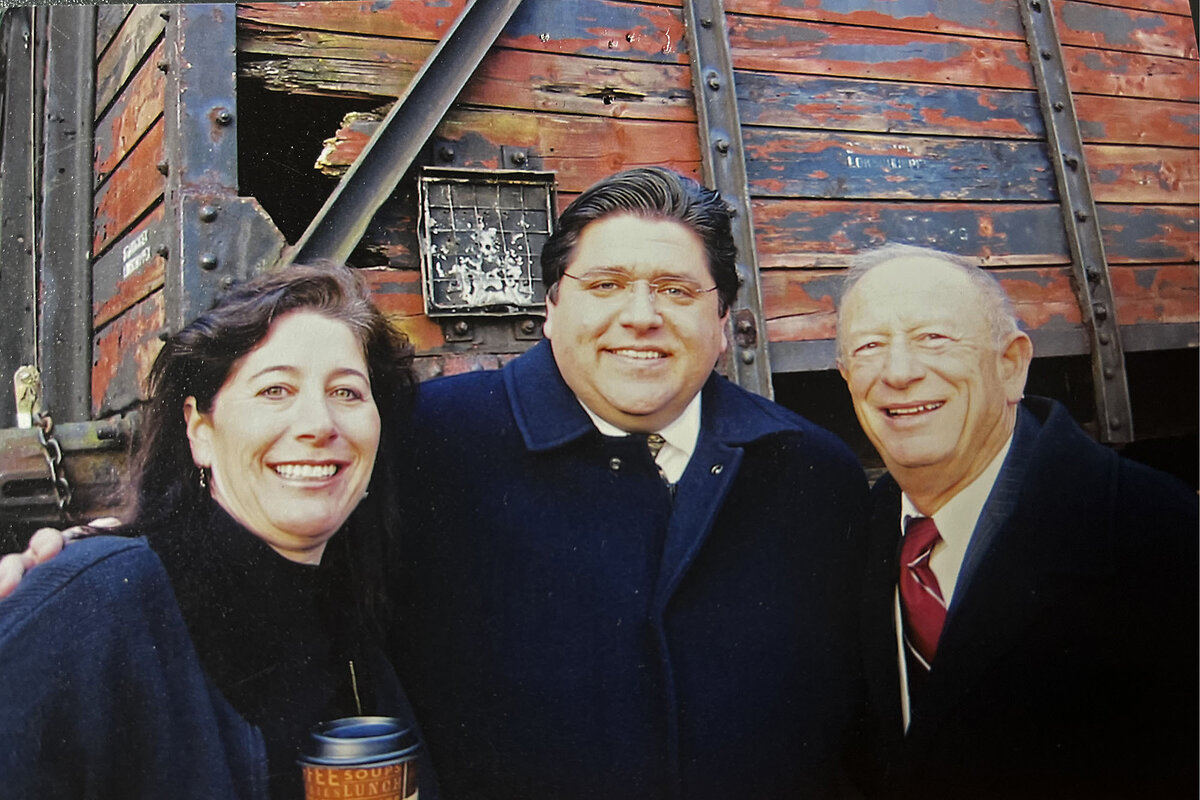
Mr. Pritzker (center) stands with Sam Harris and his daughter Julie Kreamer in front of the German railcar that became the Illinois Holocaust Museum’s centerpiece. Mr. Harris brought the idea of supporting the museum to Mr. Pritzker.
“I’ve seen the impact he’s allowed the survivors to have on him. I’ve seen him get emotional with them. I’ve seen him hug them and hold hands with them as they’re sharing the most difficult parts of their stories,” says Kelley Szany, the museum’s senior vice president of education and exhibitions.
Ms. Szany says Mr. Pritzker pushed to make sure the museum focus not just on the past – but also on the prevention of similar horrors in the future. The museum’s slogan: “Remember the past, transform the future.”
Pritzker doesn’t take the comparisons to that period lightly, say those who have discussed it with him privately.
Rick Hirschhaut, the museum’s director from 2004 through 2014, spoke to Pritzker the day after his State of the State speech and said the governor told him he’d “really labored and wrestled with the precision of his words” to make sure they were accurate and not alarmist. “He wanted to get it right and to meet the moment with his message,” he said.
In 2018, during his first run for governor, Mr. Pritzker took time off the campaign trail to interview Mr. Wiesel’s son Elisha onstage. The conversation wasn’t political, but Mr. Pritzker’s concerns about the Trump administration surfaced nonetheless. “When you walk through the Illinois Holocaust Museum exhibits, you’ll be frightened at how many things that occurred during that period feel like they’re occurring today,” he said.
During that conversation, Mr. Pritzker was told a bunkmate of Mr. Wiesel’s in the Buchenwald concentration camp was in the audience. He brought him onstage and ceded his seat and microphone, happy to step aside.
“When JB would be in conversation with survivors, he listened with every fiber of his being. What ultimately would be created had to be what the survivors wanted,” says Lillian Polus Gerstner, a daughter of Holocaust survivors who ran the original museum and served as director of public programs at the new site.
In a 2022 speech to Florida Democrats, Mr. Pritzker talked about how his relationships with survivors had affected him and shaped his life’s mission.
“What I learned, working so closely with survivors of genocide, is that history loses all meaning if we sanitize it,” he said. “And we are cowards, unworthy of the blessings of our ancestors, if we don’t wear ourselves out fighting every attempt to cast a group of people as less than human, less worthy of fundamental rights, less deserving of basic decency and love and respect.”

Melanie Stetson Freeman/Staff
A photo of a group of Holocaust survivors is pinned to a bulletin board in Holocaust survivor Sam Harris’ office.
A dramatic rise in antisemitism
President Trump isn’t the only thing worrying Governor Pritzker these days.
The Charlottesville, Virginia, white supremacist rally and riot in 2017 was followed by white supremacist attacks on synagogues in Pittsburgh in 2018 and outside San Diego in 2019. Israel’s brutal invasion of Gaza in response to Hamas’ Oct. 7, 2023, attack has led to a backlash against Israel, including antisemitic threats and violence from the left.
The past few years have featured “a rise in antisemitism that I have never seen before in my life,” Governor Pritzker says.
The Anti-Defamation League recorded more than 9,300 antisemitic incidents nationwide last year – the most in 45 years, and a nearly ninefold increase from a decade ago.
In April, an arsonist attacked the home of Pennsylvania Gov. Josh Shapiro, citing his support for Israel. In late May, a Chicago man flew to Washington, D.C., and opened fire outside the Capital Jewish Museum, killing two Israeli Embassy employees. One of Governor Pritzker’s staffers was there.
“It made it very personal,” he says.
Just days before Governor Pritzker sat down with the Monitor, a man threw Molotov cocktails at pro-Israel Jewish demonstrators in Boulder, Colorado, who were calling for the release of Israeli hostages. One of the 15 wounded was an 88-year-old Holocaust survivor.
It’s gotten harder to be a Jewish politician in America, Mr. Pritzker says. His religion rarely came up in his first campaign. But death threats and antisemitic comments directed at him have skyrocketed in recent years, from both the left and the right. He’s had anti-Israel protesters show up at his home in the middle of the night. He’s had to increase his security. One person who’d made threats against his family was sentenced to four years in prison just days before the interview.
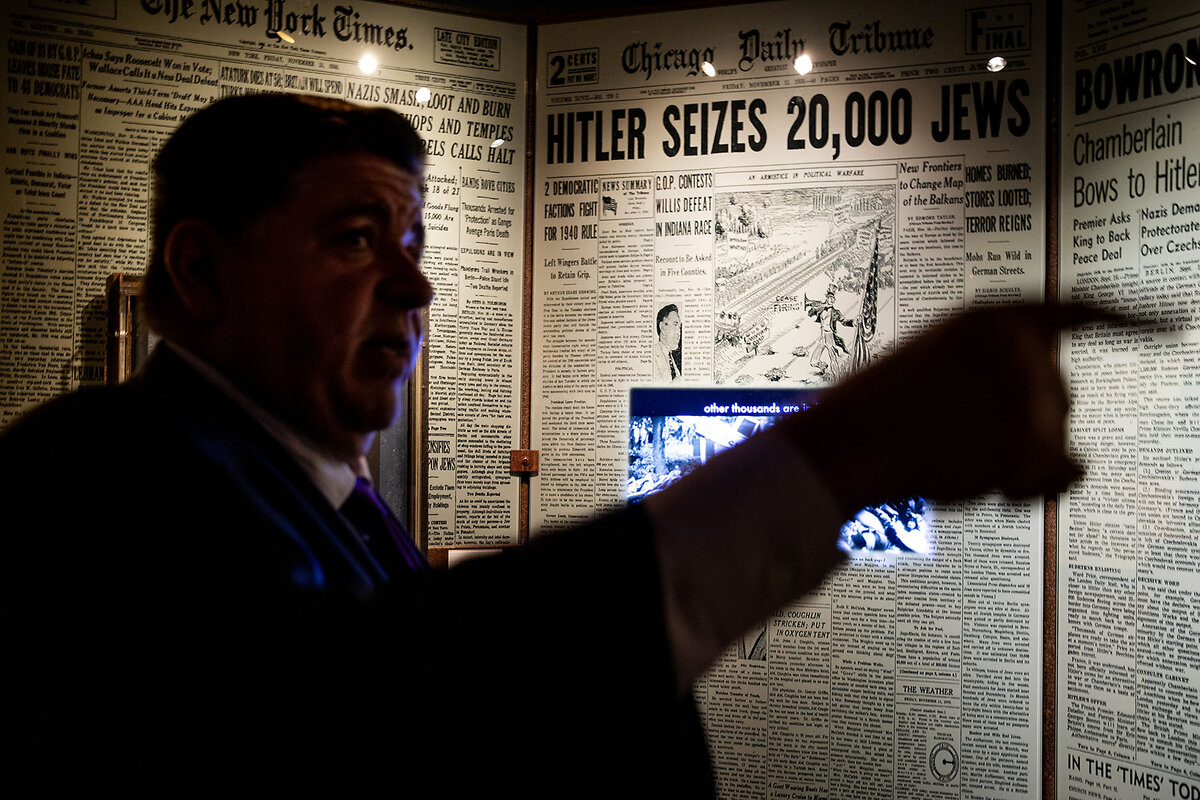
Melanie Stetson Freeman/Staff
Governor Pritzker gestures in an exhibit with newspaper stories about Adolf Hitler, at the Illinois Holocaust Museum, June 4, 2025.
He blames President Trump for the initial surge of antisemitism, but says anger from Israel’s ongoing assault in Gaza has made things worse.
“The rise of antisemitism across the United States has been seemingly exponential since just 2019,” he says. “We have the president that we had back then. But there seems to have been a broader acceptance driven by the war in Gaza.”
Mr. Pritzker is one of six Jewish governors currently in office, all of them Democrats – the most to hold that position at the same time in U.S. history. There are 10 Jewish senators, and 25 Jewish House members from both parties, high numbers considering that Jews make up just 2.4% of the U.S. population. Americans’ willingness to support a Jewish president has risen significantly over the past half-century, with around 9 in 10 Americans consistently saying they’d vote for a qualified Jewish candidate in polls since 1999.
In 2000, Joe Lieberman came within a few hundred votes of becoming the first Jewish vice president. And Vermont Sen. Bernie Sanders ran arguably the most successful presidential campaigns of any Jewish presidential candidate in U.S. history in 2016 and 2020.
Fairly or not, however, Jewish candidates face more questions, and more pressure about their views on Israel, than other politicians. Left-wing anger at Governor Shapiro’s pro-Israel views were seen as hurting his chances of becoming Vice President Harris’ running mate in 2024. Governor Pritzker was also vetted, but not chosen. (It’s worth noting that many who loathe Israel love Senator Sanders, who has strongly condemned Israel’s invasion – many voters who hold stridently anti-Israel views are still open to Jewish candidates who share their views.)
Governor Pritzker’s specific profile as a billionaire businessman might also be a hard sell in a Democratic primary. The last Jewish billionaire to run for president, Michael Bloomberg, flopped spectacularly in his 2020 run.
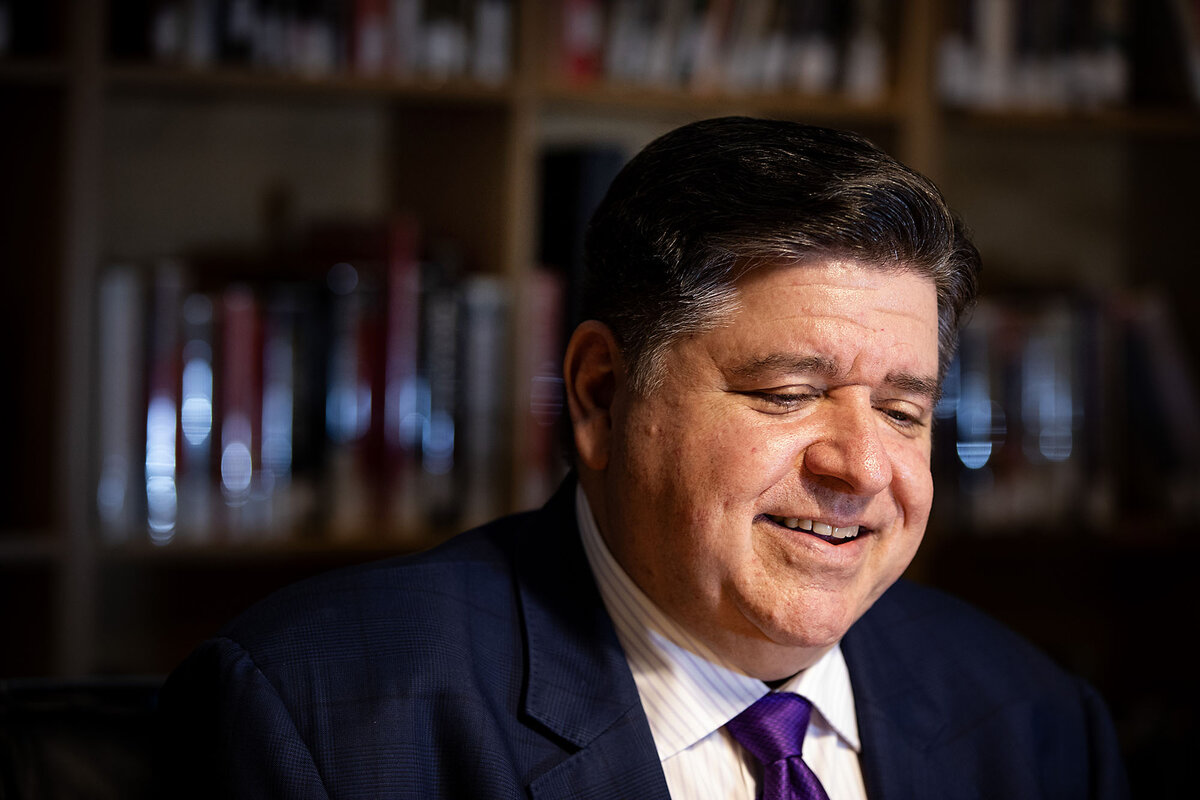
Melanie Stetson Freeman/Staff
Mr. Pritzker gives an interview at the Illinois Holocaust Museum in Skokie, Illinois, June 4, 2025.
If you Google “JB Pritzker Gaza,” the first hit that pops up asks if he is “a zionist or genocide-supporter.”
In the immediate aftermath of the Oct. 7 attack, Governor Pritzker said that Illinois “unequivocally stands” with Israel, and prayed for “strength and safety of the men and women of the Israeli Defense Forces as they embark on this most difficult and important mission” of destroying Hamas.
He’s since called for an end to the conflict, posting on the one-year anniversary of the attack that “It’s past time to honor the innocent Palestinian and Israeli lives lost by securing the release of the hostages and implementing a ceasefire.”
Asked if he believes Israel is committing genocide in Gaza, he demurs. “You know, there’s a room in the museum where the definition of genocide is laid out, and I think that’s for other people to address.”
Mr. Pritzker says he stands by Israel’s right to exist and defend itself. But he makes clear he isn’t happy with how Israeli leaders have handled the invasion.
“The war in Gaza began with an attack by Hamas, a terrorist organization, against Israel, and the response by Israel should be focused on Hamas, a terrorist organization. Those are the murderers – not the innocent population of Palestinians who live in Gaza,” he said. “Not enough has been done to protect innocent Palestinians.”
What “Never again” means
President Trump has responded to the widespread anti-Israel protests on college campuses by cracking down on foreign students in the name of rooting out antisemitism. The administration has arrested and moved to deport pro-Palestinian protesters who were here legally, many on student visas.
It has formed a “Task Force To Combat Anti-Semitism” that has aggressively targeted universities, threatening their funding. And it has sought to make a particular example out of Harvard University.
Mr. Pritzker’s sister Penny, a former Obama administration commerce secretary, is the chair of Harvard’s governing board. The governor says he’s “proud” of her work leading the school’s fight against the Trump administration – and furious that Trump officials are using, as he sees it, charges of antisemitism to target and threaten entire groups of people, including targeting protesters whose views he disagrees with.
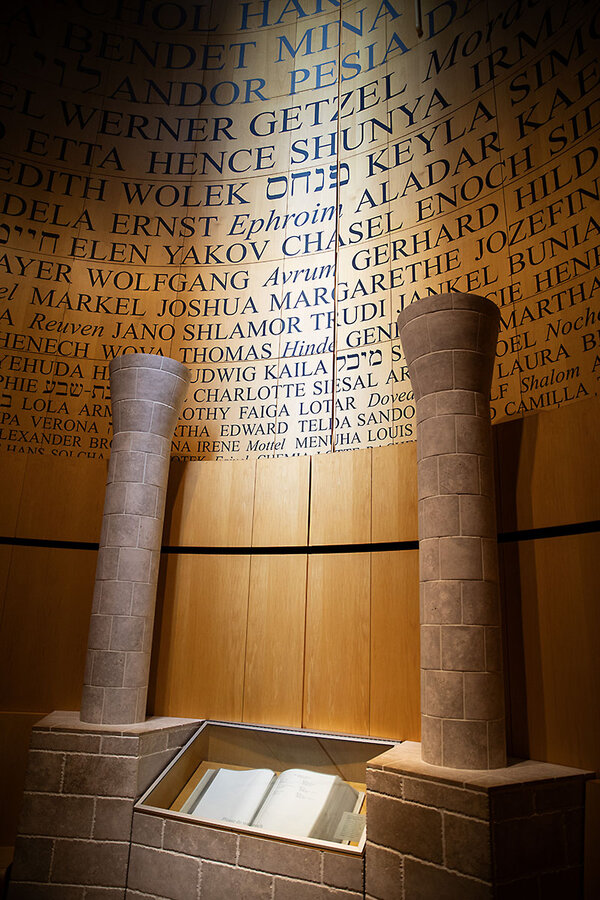
Melanie Stetson Freeman/Staff
The Room of Remembrance has names of those in the Chicago community who survived the Holocaust, at the Illinois Holocaust Museum in Skokie, Illinois, June 4, 2025.
Unprompted, he takes a shot at Mr. Trump’s deputy chief of staff Stephen Miller, the architect of the president’s immigration crackdown – and the most prominent Jewish member of his team.
“Stephen Miller is the purveyor of much of this,” he says. “It’s very disappointing and sad.”
When asked what he means, Mr. Pritzker pauses.
“It is disappointing and sad that he has been put in a position where he is driving much of this,” he says “And second, because he’s Jewish. And it’s an anti-immigrant sentiment that he is clearly pushing.”
Mr. Miller didn’t respond to requests for comment. White House deputy press secretary Abigail Jackson responded: “The only thing that’s sad is JB Pritzker’s desperate attempt to stay relevant when his woke, left-wing ideology has been repeatedly rejected by the American people.”
But Mr. Miller has been publicly critical of Governor Pritzker in the past, saying his April New Hampshire speech “clearly could be construed as inciting violence.”
Mr. Pritzker scoffed in response, saying he’d called for peaceful protest.
President Trump, whose daughter Ivanka converted to Judaism, has made a number of remarks that many Jews have taken as antisemitic. He regularly invokes an old antisemitic trope that Jews have a dual loyalty, repeatedly telling Jewish Americans how much he loves “your country” of Israel. In 2015, he told the Republican Jewish Coalition that it wasn’t supporting him because he couldn’t be bought and “You want to control your own politicians.” In late 2022, he dined with white nationalist Nick Fuentes and rapper Ye, formerly Kanye West, who has regularly expressed antisemitic views.
When Mr. Trump said in 2019 that Jews who voted Democratic showed “great disloyalty,” Governor Pritzker accused him of telling Jews “You’re the other; you’re not one of us; you’re not American; you don’t belong.”
Illinois Rep. Brad Schneider has been friends with Governor Pritzker long before either ran for office. They were both involved in a Chicago chapter of a national Jewish organization in the early 1990s. Mr. Schneider chairs the New Democrat Coalition, a group of centrist House Democrats, and has pushed his party to moderate both on tone and policy over the years. But he lauds Mr. Pritzker for taking a stand – and showing his authentic self in doing so.
“He has not shied away from who he is in all of its manifestations, including his Jewish identity,” he says. “I agree with him. We have to call out [the administration’s] efforts to dismantle the Constitution and undermine the rule of law.”
Back in Skokie, as Governor Pritzker wraps up the tour of the museum, he is asked what “Never again,” the rallying cry of Holocaust survivors, means to him.
“It means our obligation – all of us, and I don’t just mean Jews – it means all of our obligation is to make sure that the horrors, the targeting, the inhumanity of the Holocaust, must, at every angle, be pushed back on, fought, against, prevented,” he says.
Is that what’s fueling him now?
“I am in a moment when it is my obligation as a public official, as a Jew, and as somebody who has been engaged in fighting antisemitism my whole life – and who can see the degradation of democracy occurring,” he says. “Anybody, if they understand what ‘Never again’ meant about the Holocaust, understands that this is a moment when we should be standing up and speaking out.”
Editor’s note: This article was updated on June 13, the day of initial publication, to include a quote from former museum director Rick Hirschhaut.























